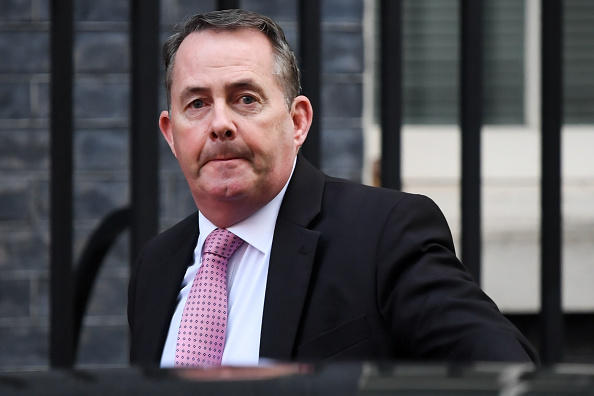As The Spectator‘s podcast editor, I’m all for spending more money on podcasts. There are now six million adults in the UK who listen to podcasts, every week. If growth continues on that path, podcast listenership will be on par with total Radio 4 listenership in just another five years. With a trajectory like this, it’s no wonder that everyone wants in on the game.
Trade secretary Liam Fox is the latest to join the club. But it looks like he’s been too enthusiastic. The Department for International Trade podcast series – ‘Local to Global’ – is funded by the taxpayer and has cost over £100,000 to produce and promote. It has received fewer than 9,000 listens (that’s in total, not per episode). It was meant to encourage businesses to export globally with the dulcet tones of Apprentice star Nick Hewer. Fair enough. But with such appalling numbers, it means that DIT had essentially dished out £12.70 per listen, at least 100 times the industry average.
This is a pretty painful investment and, with 250,000 weekly listens to our podcasts, certainly not a cost per listen model that we at The Spectator could emulate. When it comes to making a podcast on a budget, there are some easy guidelines Fox ought to consider the next time around:
1. Don’t worry about the recording studio
When podcast guests come to The Spectator, we record in Editor Fraser Nelson’s office. Wowed as they are by Fraser’s whisky cabinet and the verdant view of St James Park, few notice that our ‘recording studio’ has only single glaze windows, a number of books and soft furnishings like Boris’s infamous chaise longue to serve as ‘padding’, and a door that doesn’t quite lock – allowing unsuspecting editors to barge in mid-recording. It’s not quite the BBC, but I’m told that our listeners quite enjoy the ambient sounds of birdsong and ambulance wail as James Forsyth divulges the latest news from Westminster. Having had a quick listen through to Fox’s podcast, I heard very little background noise. Kudos to them for finding a better studio than office, but considering these studios go for £100-£200 per hour in London, it’s probably the first place to cut costs.
How do Labour and Tory MPs feel about Corbyn and May’s Brexit u-turns this week? @katyballs asks @NickBoles, @siennamarla, and @JGForsyth whether both parties are being stretched to breaking point. #SpectatorPodcast out tonight pic.twitter.com/KDuBw1jBFR
— The Spectator (@spectator) February 28, 2019
2. Equipment isn’t everything
And as for the mics, which come with a professional studio, fear not: here are some industry secrets. Our own easy, retro set of four mics and a mixer box cost around £2,500, already ten times cheaper than Foxcast’s £25,000 spent on production alone. But when the team went to Conservative Party Conference last October, I didn’t lug the equipment to Birmingham. Instead, we just used our phones. It turns out that Steve Jobs’s iPhones (model 6 and onwards) are fine when it comes to professional quality (excusing for a little more background noise). A great many sound engineers will tell you otherwise: but they would, wouldn’t they? So you don’t have to pay any equipment costs, provided you already have a smartphone.
3. Star appeal? Find a friend
The thing that’s really costing lots of money in Foxcast is probably the celebrity host. I like Nick Hewer as much as the next girl, but with so many guests available in and around Westminster, Hewer’s £10,000-£19,999 speaking fees seem a little steep. Fox should have called in a favour with one of his podcast friendly colleagues to host the six episodes (total running time is three hours). Okay, DIT might not be the most fun lot, but just down the road in Whitehall, cabinet colleagues like Liz Truss and Andrea Leadsom both have plenty of podcast experience, and casting the net wider, The Spectator‘s recorded with Conservative Party Chairman Brandon Lewis and passionate Global Britainers Iain Duncan Smith and Jacob Rees-Mogg.
4. Editing isn’t expensive
Okay, of course my skills are valuable and Fraser, if you’re reading this, my salary is definitely worth every penny. But… editing isn’t expensive. I wish I could say otherwise, yet the truth is a careful teenager with enough attention to detail and common sense can edit a podcast. So if Fox spent a fortune on a BBC-trained producer: again, unnecessary.
Now don’t get me wrong, it’s hard to get more than a handful of listens with new podcasts, especially in the early days (unless it’s presented by David Tennant or plugged by Jordan Peterson). It has taken us years to build up the listenership we do have. Money simply cannot buy an audience. Print advertising doesn’t really work: podcasts are driven by audience recommendations, ratings and reviews, and (most of all) word of mouth. None of these are for sale. The DIT should have thought about this before splashing out a six figure sum on the project (The Mirror reports that the vast majority of the money – £82,000 – was spent on advertising, and for what?).
Podcasting isn’t easy, but the one thing it can be is cheap. That’s why even twenty-somethings rambling in their parents’ garage can record and upload. If the good Dr Fox is thinking about a second series, maybe just sponsor a podcast with The Spectator instead. It’d cost much less than six-figures.







Comments